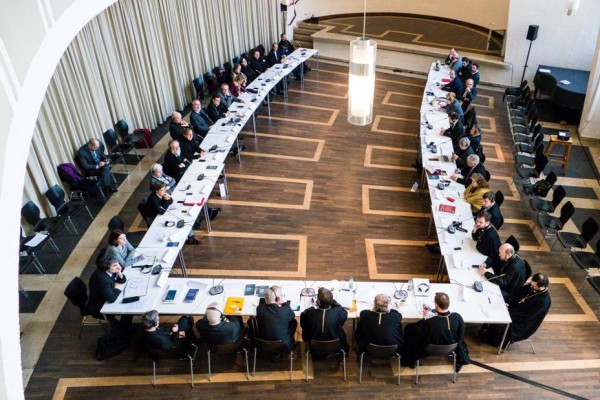The delegation included Metropolitan Hilarion of Volokolamsk, chairman of the Moscow Patriarchate’s Department for External Church Relations, head of the delegation; Archbishop Feofan of Berlin and Germany, deputy head of the delegation; Archimandrite Philaret (Bulekov), DECR vice-chairman; archpriest Vladimir Khulap, prorector for academic affairs and head of the Chair of Church and Practical Disciplines of the St-Petersburg Theological Academy; archpriest Valentin Vasechko, associate professor of the Chair of Systematic Theology and Patristics of St Tikhon’s Orthodox University of Humanities; Rev. Antony Borisov, prorector of the Moscow Theological Academy; Mr. Vladimir Burega, prorector of the Kiev Theological Academy; Ms Margarita Nelyubova, DECR staff member, coordinator of the Russian Round Table for Diakonia; Mr. Alexander Rahr, director of the Russia-Eurasia Centre and honorary professor of the Moscow State University of International Relations; and Ms Yelena Speranskaya, a DECR consultant and lecturer of the Moscow Theological Academy.
The delegation of the Evangelical Church in Germany, led by Bishop Prof. Dr. Heinrich Bedford-Strohm, chair of the EKD Council, also included Provost Siegfried Kasparick, Lutherstadt Wittenberg; Prof. Dr. Christfried Böttrich, Greifswald University; Pastor Susanne Fleischer, Deizisau; Pastor Cornelia Füllkrug-Weitzel, Director of the “Bread for the World” Charity Organization; Pastor Prof. Dr. Dagmar Heller, Geneva; Pastor Martina Severin-Kaiser, Hamburg; Pastor Prof. Dr. Martin Tamcke, Göttingen University; Pastor Dr. Jennifer Wasmuth, Humboldt University of Berlin; Dr. Martin Illert, Superior Church Counselor, Hannover; and Pastor Prof. Dr. Reinhard Thöle, The Martin Luther University of Halle-Wittenberg.
As Metropolitan Hilarion noted in his address, among those who fell victim to the war were representatives of all confessions and religions. The archpastor focused on the heritage of a Lutheran pastor, Dietrich Bonhoeffer, who was executed by the Nazis. Metropolitan Hilarion also dwelt on the role of the Russian Orthodox Church and the Evangelical Church in Germany in promoting reconciliation between the peoples of the two countries. As the DECR chairman pointed out, the liberal understanding of Christian moral values, developed in Western Protestant Churches in recent decades, became the reason for the suspension of the bilateral theological dialogue which began in 1959. At the same time, new challenges and tasks have arisen, urging Christians of various countries to develop cooperation, Metropolitan Hilarion noted. Nowadays, a Christian’s duty is not only to promote reconciliation in numerous conflicts flaring up in different parts of the world, but also to exert every effort to save Christians and preserve Christianity in the Middle East. To conclude his address, Metropolitan Hilarion noted the significance of joint projects in the sphere of theological education.
Greeting all those present at the conference, Bishop Heinrich Bedford-Strohm emphasized the importance of developing cooperation between the Russian Orthodox Church and the Evangelical Church in Germany in upholding the Church’s right to openly express its opinions and be an equal member of civil society.
The first part of the conference was dedicated to the biblical and patristic aspects of the topic of war and peace. The speakers focused on the notions of war in the texts of the Old and the New Testaments. Discussed during the second part of the conference were various issues of diakonia and social ministry of the Church. The third part of the conference was dedicated to the activities of the Churches from the perspective of secular society.
To mark the conclusion of the conference, its participants visited the Dachau Concentration Camp Memorial Site and commemorated the victims of the Nazi regime at the Protestant Memorial, Church of Reconciliation, and the Russian Orthodox Church of the Holy Resurrection.

















